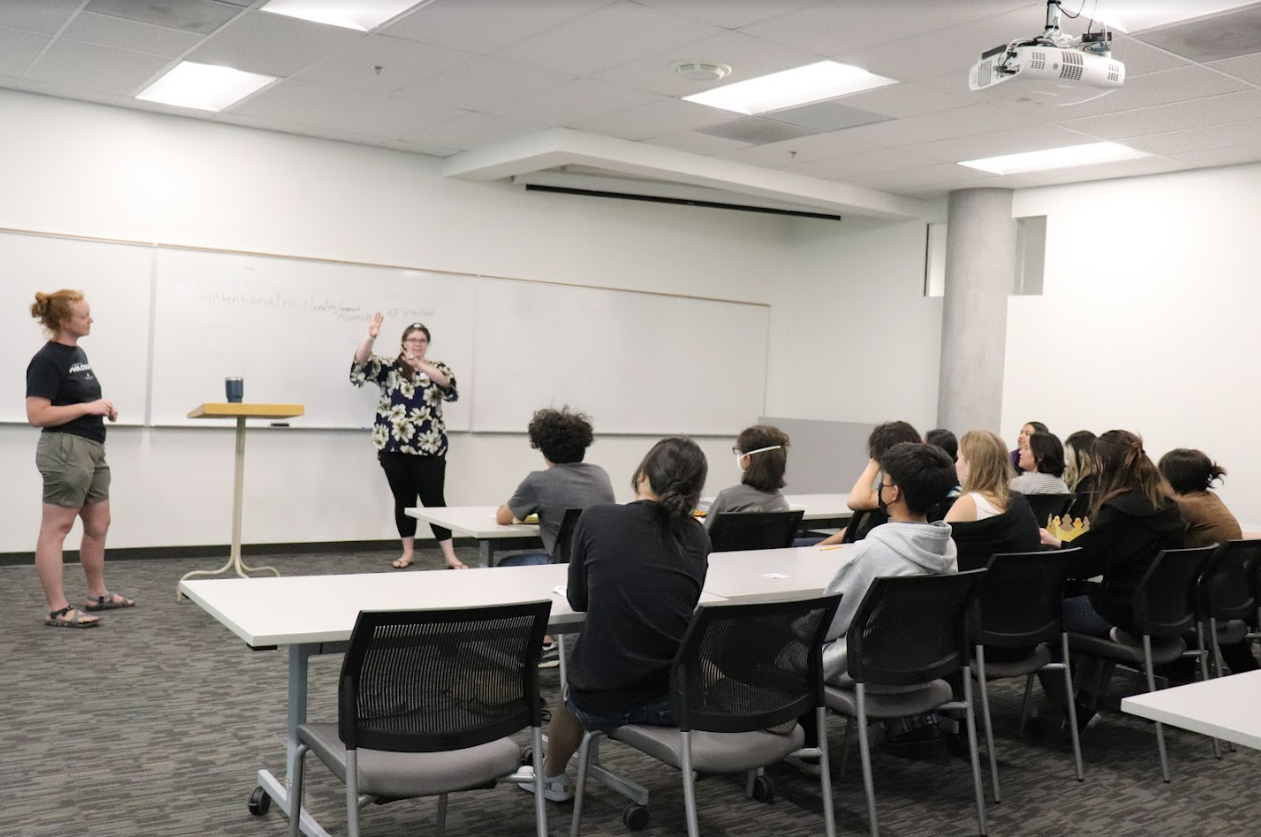ASU philosophy camp teaches local high school students how to have disagreements

Philosophy PhD candidate Angela Barnes guides a discussion with high school students at an ASU philosophy summer camp. Photo by Rachel Bunning/ASU
Over the summer, the School of Historical, Philosophical and Religious Studies at Arizona State University hosted its inaugural philosophy summer camp for high school students.
The camp came together as a combined effort between philosophy graduate students and philosophy faculty to get young students interested in philosophy and to understand what it entails.
Philosophy Professor Joan McGregor was happy to bring the students onto campus to give them the opportunity to not only learn about philosophy, but to see themselves as university students as well.
“The experience for them can be transformative,” McGregor said. “High school students are natural philosophers, asking the big questions.”
PhD candidate in philosophy Angela Barnes initiated the idea based off of a similar project she was involved with when she was a student at Ohio State University.
“In high school especially, we are starting to really wrestle with philosophical questions, about ourselves and our identities, our systems of beliefs and morals, and the value and purpose of living well,” Barnes said. “I am interested in building homes for curious minds, and this summer camp was one way that I could share that vision with our community here in the Valley.”
Barnes worked with fellow graduate students Aubrial Harrington and Triston Hanna to create a schedule and agenda for the camp. They settled on the topic of "disagreement" as the theme for the camp.
“We are constantly bombarded with the idea that we should hate people that have different beliefs than us, particularly different political beliefs,” Barnes said. “The polarization of ideas and the news outlets covering them make it seem as though you just have to pick a side — that critically engaging with the other side is a waste of time. My other instructors and I disagree.”
In helping students engage in disagreement, Barnes says students can examine and learn from people who think differently than them. The benefits of doing so are that students can come closer to knowing the truth by knowing all sides of an argument, and they don’t have to engage with the world as if half the population is their enemy.
The high school students showed up to the camp with many questions and a curiosity to learn. Over the week, they learned how to listen carefully, break down arguments and be charitable.
“The opportunity to teach these young people how we can have actual influence on our day-to-day lives using philosophy has multiple good effects,” Barnes said. “Watching philosophy at work in young minds, opening them up to new possibilities, gave me so much satisfaction. That is the very thing that drove me to pursue a PhD in philosophy.”

Philosophy PhD candidates Aubrial Harrington (right) and Angela Barnes presenting to the campers. Photo by Rachel Bunning/ASU
Owen Fisk, a high school sophomore student who participated in the camp, said he felt he was able to use what he learned over the summer in a class that did a Socratic seminar this fall.
“One thing that impacted me the most was definitely the argument structures, specifically how to not include logical fallacies in my arguments and how to listen to other arguments,” he said.
Another high school student, a junior named Adelina Grotenhuis, said she enjoyed learning the principles of philosophy and getting to meet other kids her age who shared her interest in philosophy.
“I love the sense of community,” she said. “I just wish more people knew about this.”
Next year’s camp is already in discussion. The focus of the camp is still an ongoing topic and the students and faculty are working on securing more funding to increase access to the program.
“We hope to be able to provide more scholarships this year so that there are no barriers to curious minds that would want to come participate in this program, see ASU's campus and start to get a feel for what it might be like to come study at a university,” Barnes said.
More Law, journalism and politics
Can elections results be counted quickly yet reliably?
Election results that are released as quickly as the public demands but are reliable enough to earn wide acceptance may not…
Spring break trip to Hawaiʻi provides insight into Indigenous law
A group of Arizona State University law students spent a week in Hawaiʻi for spring break. And while they did take in some of the…

LA journalists and officials gather to connect and salute fire coverage
Recognition of Los Angeles-area media coverage of the region’s January wildfires was the primary message as hundreds gathered at…

